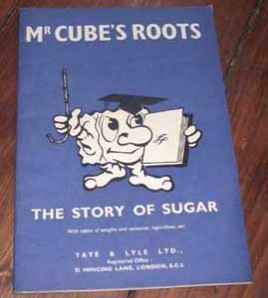Love Lane Lives
The history of sugar in Liverpool and the effects of the closure of the Tate & Lyle sugar refinery, Love Lane
Hillside Pupils discover the real story of SUGAR
Written by Ron Noon at 08:17 on Monday, September 21st 2009

SUCROSE BLOGS FROM HILLSIDE SCHOOL
This is not in FACT a blog from HILLSIDE SCHOOL but more of an announcement on the first morning of SUGAR WEEK of our plans for a potentially excellent category for the pupils to write up themselves. I left the school playground way back in the pre-industrial period when Tate & Lyle Love Lane Sugar Refinery seemed a permanent Liverpool landmark, as irreversible as night and day.
Facts do not speak for themselves and in history there is a “processing process” whereby ORDINARY facts about the past are elevated to the status of historical facts. Who and what decides the applicability of the adjective historical when deciding on the STATUS of past events? There is a great deal about ordinary people’s everyday lives that is never deemed HISTORICAL and which despite the obvious enthusiasms of social and labour historians is hardly ever touched on in the books and articles placed on school library shelves. In how many school history books is there refererence to the FACT that Henry Tate’s mother plant, Liverpool Love Lane, closed down on April 22nd 1981 leaving a big hole in the community, as well as marking the end of over three hundred years of Liverpool links with African, Caribbean and Pacific cane sugar growing countries? What about the “extraordinary ordinary lives” of the boys and girls from the whitestuff who sweetened the nation’s breakfast tables for so long? What about the real story of an achingly addictive drug which is now into its seventh century of global expansion and which to the delight of the food processors and the sugar lobby overcomes the finite limits of the stomach? We seem to not only find room for something sweet but consume “liquid candy” in quantities which pose massive public health problems.
Voltaire cynically suggested that “History was the lie that historians agree upon” and without impugning the profession I belong to and which affords me access to the means of material life, there is always a need to assess the selection and interpretation of evidence and the extent to which it can be BIASED. (Was Voltaire aware of the powers of “spin” way back in the 18th century the era of the Enlightenment?) To paraphrase a good historian I read many years ago, the only completely unbiased historian “is the recording angel but unfortunately his works are as yet unpublished, and even he according to Mark Twain, has opinions which to Satan might appear like prejudices”! Debate and interpretion and the effort to be as objective as is possible, is a maxim that all teachers in all disciplines, not just history are hopefully committed to. That said when it comes to the market place and the versions of “truth” and fact that are relayed about sucrose then the powerful sugar lobbies around the world have candy legs to stand on, especially the claim that their product is NATURAL!
Finally and as a way of introducing some other FACTS which you may or may not agree upon, this is what the BBC news report highlighted as their TOP TEN five years ago! Making allowance for the inclination of Rupert Murdoch’s son to describe it as the BIASED BROADCASTING CORPORATION I personally feel as a license payer that it has more claims to VERACITY than sweets processed by MEDIA MOGULS. Here we go then with our starter for TEN:
Here are 10 quick facts you may or may not have known about sugar, the sugar industry and related businesses.
• In 2002, almost 132 million tonnes of sugar were consumed worldwide. [Source: The ethical sugar organization; iafrica.com]
• Countries in the European Union consumed around 14 million tonnes of that figure. [Source: The ethical sugar organization; iafrica.com]
• The UK consumes around 2.25 million tonnes of sugar per year, about three-quarters of which is sold direct to industrial users, such as manufacturers of soft drinks and confectionery. [Source: DEFRA.]
• The consumption of fizzy drinks in the UK has almost doubled in the past 15 years. Young adults now drink an average of six cans each week. [Source: National Diet and Nutrition Survey 2002, quoted on the Food Standard Agency’s website.]
• The European confectionery market - of which sugar confectionery such as gums, jellies and toffees represents a keen slice - is a significant sector of the European food industry. In the UK alone, a recent report from Key Note estimated the segment to be worth £5.96 billion in 2002. [Source: Food and Drink Europe.com]
• Children in the UK spent £433m on sweets, crisps and fizzy drinks on their journeys to and from school in 2002. This was up from £365m in 2000. [Source: The Sodexho School Meals and Lifestyle Survey]
• A Foods Standard Authority Consumer Survey in 2000 found that only 12 per cent think that labels are very easy to understand. [Quoted in Royal College of Physicians, Royal College of Paediatrics and Child Health, Faculty of Public Health, February 2004]
• The convenience foods sector, has grown by 70 per cent over the past 10 years. It is also the largest sector, with almost £17bn spent on convenience food in 2003. This figure represents a billion pounds more than in 2002, and almost a third - 32 per cent - of the total spending on food. [Source: Mintel]
• British consumers munch their way through 10kg of chocolate per person, each year, well ahead of any other country in Europe. [Source: Datamonitor’, The European Confectionery Market to 2007]
• In 2003, a total of 616 million kg of chocolate was sold in the UK. [Source: Datamonitor’, The European Confectionery Market to 2007]
Story from BBC NEWS:
October 2004
